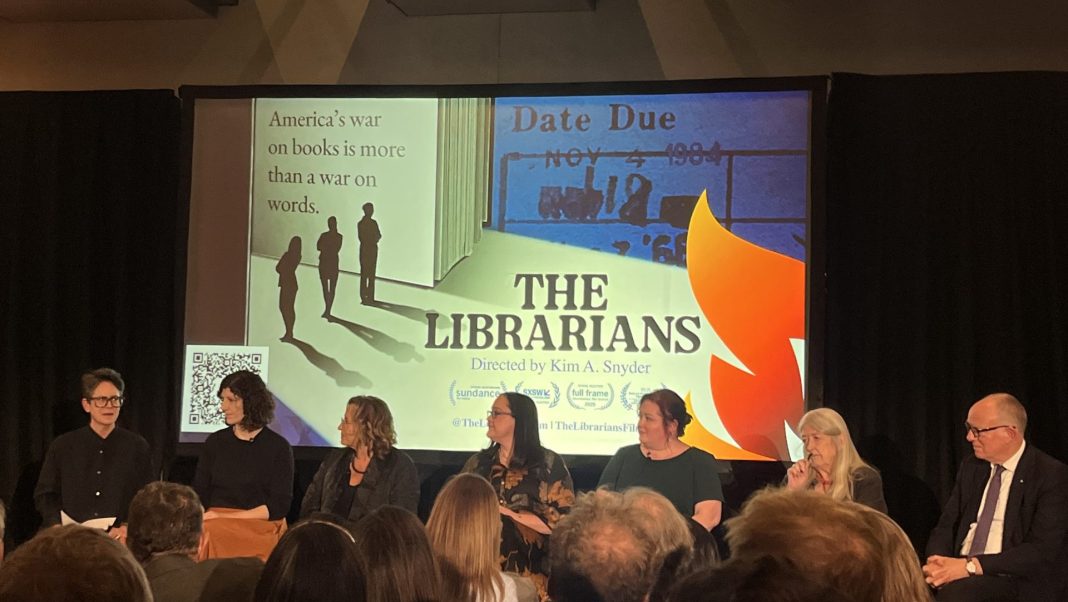Kim A. Snyder’s The Librarians (2025) draws the audience into a pernicious web of censorship, repression, and culture-war collisions.
Embroiled in a fierce, sombre, and at times failing fight for free speech, the film balances its heavy themes with moments of light-hearted humour, principally in the fashion of hilarious one-liners from the high school librarians that act as the documentary film’s heroic, and immensely empathetic, underdogs. The crowd gathered for the private screening at Weston Library in Oxford – only the second screening of the film, which premiered last week – oscillated between the laughter of disbelief and shaking heads.
The film follows the librarians who found themselves at the vanguard of the battle against censorship in U.S school libraries. Their collections were targeted by white Christian nationalists, in an organised movement led by Moms for Liberty. These perhaps unlikely heroes rise to the occasion, becoming – as Amanda Jones, one of the featured librarians, phrased it in the panel discussion – accidental activists.
Beautifully crafted, the film interweaves archival footage of Nazi book burnings, interviews, literary quotes, school board meeting footage and even discursive TikToks into a network of corresponding ideas that are visually pleasing, contemplative, and poignant.
It’s hard to ignore the fact that all of the eponymous protagonists are women persecuted on the basis of their profession. Amongst the panellists for tonight’s screening are Amanda Jones and Julie Miller, two librarians who’ve dealt first-hand with the professional and personal impact of the so-called ‘Krause List’, a 2021 document of 850 titles compiled by then Texas-state representative Matt Krause deemed to contain inappropriate and/or illicit content.
“You never think it’s going to happen to you or your community”, says Jones, a school librarian and anti-censorship activist based in Louisiana. “It’s very scary. They do it so quietly. You don’t realise it’s happened until it’s already happened.”
“I know about censorship. Here it is in the handbook. I’m ready for this”, ironizes Miller, an ex-librarian who was ousted from her post in Clay County, Florida, after vocalising her opposition to new state regulations on school reading material. “I was not ready.”
Miller maintains that her personal politics have never had any bearing on what titles she chooses to add to the school collection; she believes her locale was identified as a fruitful site to propagate pro-censorship ideals. “I didn’t realise that the community I was in was being specifically targeted”, Miller says.
When asked if censorship mania is exclusive to the south, the panellists concur on its ubiquity.“There’s a certain flavour of it [in the south]”, Snyder concedes. “[But] it’s everywhere. It’s metastasising.”
Speaking to Cherwell, Snyder, an Oscar-nominee for her documentary Death By Numbers (2024), indulged that ‘documentarian’ was her favourite way to be described. The best thing about the job? That she is able to be “perpetually a student”. She loves being able to “open up a whole new world, to start all over again”.
Richard Ovenden OBE, Bodley’s Librarian, received the Royal Society for Literature’s Benson medal prior to the film screening. “We need to be alert to the dangers we face”, said Ovenden, invoking the significance of the Public Libraries Act 1850 in his acceptance speech. “We take these things for granted at our peril.”
Later, Ovenden is seated on the panel beside a surprise panellist, Dame Mary Beard. Politely declining the opportunity to discuss Roman book burnings, Beard half-jokingly describes her own experience of censorship, at the hands of her mother.“Sixty-five years ago, my mum didn’t let me read Enid Blyton [books]. Because they were far too posh and conservative.” Beard uses the anecdote to wrestle with the fact that censorship can be – and is – a tool used at both ends of the political spectrum: “It’s hard to feel that anyone is innocent”.
Snyder compares her team to “canaries in the coal mine” when they started filming. Her compulsion was “we have to tell this story; it’s about us”. Today, Snyder says, invoking the escalation of events since the dismissal of Carla Hayden in May 2025, it’s “everyone’s story”. This was only the second screening of the film, which premiered with Macmillan Publishers last week. “Some of those people at the top”, says Snyder. “They’re brave.” Very ominous, indeed.
Snyder reiterates Beard’s suggestion of self-directed suspicion, but this time on the topic of making art. “Am I not going towards that because of fear?” she asks herself when pursuing new projects.
The film highlights how incredibly well-organised these proponents of censorship are, but it’s not a one-sided arms race. In 2022, Jones co-founded the Louisiana Citizens Against Censorship, as well as founding the Livingston Parish Library Alliance. Meanwhile, Miller signposts the Florida Freedom to Read Project.
“The calvary’s not coming”, says Jones, her voice ringing out in the Weston Library foyer. “We have to save ourselves.”


